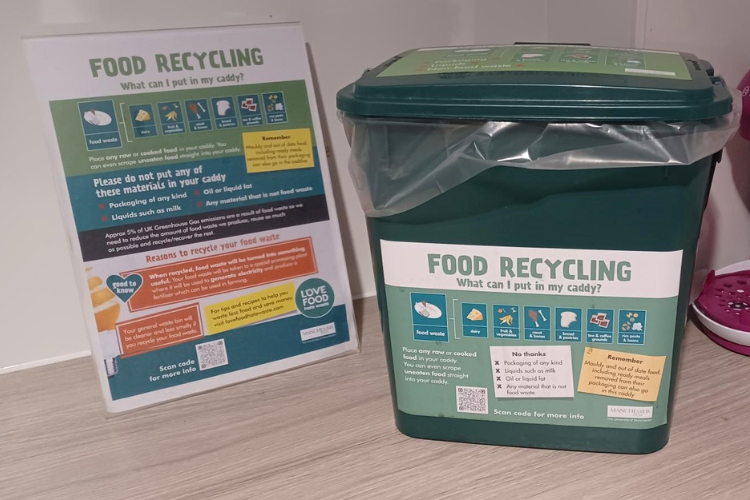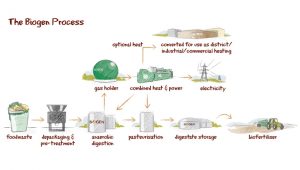
A Look into the Rollout of Food Waste Collection Caddies Across Main Campus Kitchens
Blog by Simon Atkinson, UoM Waste Manager.
The Directorate of Estates and Facilities has now rolled out food waste collection caddies to all staff kitchens on Main Campus – nearly 400 caddies in total.
The University successfully trialled the collection of food waste in staff kitchens in the Arthur Lewis, Humanities Bridgford Street and John Garside buildings back in May 2022. Following on from this, food waste caddies were installed in staff kitchens in the MECD Building A when staff started to move into that building and subsequently across all buildings on Main Campus. Caddies are also in all Food on campus outlets for their staff to use.
What we have done
10L food waste caddies/containers have been placed in staff kitchen areas and staff are being encouraged to use these for any food waste rather than putting food in general waste bins. The caddies are emptied by the cleaning staff several times a week who remove the bags of food waste and replace them with new bags. The following poster shows what items can go in the caddies – What can go in the food waste caddies. If there is a problem with your collection, please contact your cleaner/House Services Supervisor.
How food waste
Bags of food waste are taken to food waste wheelie bins at existing bin store locations by the cleaning staff and emptied by our waste contractors, Veolia (ES) UK Ltd.
How food waste is collected/treated by our waste contractors

The Anaerobic Digestion Process for processing food waste. Source: https://www.biogen.co.uk/Anaerobic-Digestion/What-is-Anaerobic-Digestion/
Food waste is collected by Veolia and taken to their Materials Recovery Facility (MRF) in Trafford Park to be bulked up, before being transferred to Anaerobic Digestion (AD) facilities in Warwickshire operated by Biogen. This AD process treats the food and produces a “digestate” that can be applied to land as well as electricity from the methane that is produced from the process and used as a fuel.
NB: Our scheme is different to Local Authorities food collections across Greater Manchester as they send their food to an In Vessell Composting (IVC) Facility.
Why can’t compostable bags be used in the food caddies
Compostable bags do break down in certain composting facilities but our food waste is treated in plants using Anaerobic Digestion (AD). This process can only treat food waste so any packaging/other materials are removed at the beginning of the process via mechanical separation. Compostable bags are not compatible with this separation process as they are stretchy and clog up the machinery so we have to use clear plastic (LDPE) bags for the collections which are more easily removed from the process. These bags and any packing is removed and sent to refuse derived fuel plants for disposal/energy recovery.
The impact of food waste
In the UK food waste from households and businesses is still around 9.5 million tonnes a year, 70% of which was intended to be consumed by people (30% being the ‘inedible’ parts). The GHG emissions associated with this are around 25 million tonnes CO2e which is equivalent to around 5% of UK emissions and the same as 10 million cars, or 1 in 3 cars on UK roads.
* Source: Waste and Resources Action Plan (WRAP)
Food waste prevention
You can help reduce food waste both on campus and at home by thinking about what you order and planning your meals. For University catered events, it is important to ensure that there are accurate numbers. If there is a change of numbers then informing catering staff of this can help reduce the amount of food waste. The University also has a list of approved charities who collect left over food from events and meetings Event food waste guidance and we now have community fridges in the Student Union.
For any feedback on the scheme or to request additional food waste caddies, please e-mail simon.atkiinson@manchester.ac.uk
The content discussed in this article aligns with United Nations Sustainable Development Goals: Zero Hunger (2), Responsible Consumption and Production (12) and Climate Action (13).
Sign up to receive the FBMH ES newsletter by contacting srbmh@manchester.ac.uk. Read our previous editions: June and October 2023
To find out more about Environmental Sustainability: visit the Faculty’s intranet page, website or contact srbmh@manchester.ac.uk . For more information on Environmental Sustainability at the University watch this short film or visit their website.

0 Comments